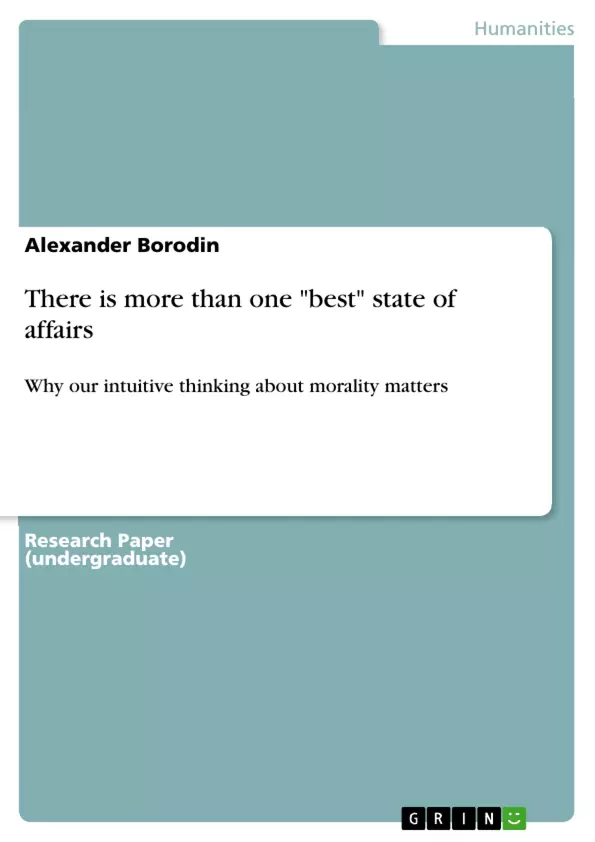The inferences we draw by employing a deontological assessment of morality may be flawed and at times exceedingly categorical, but does this insight in any sense legitimize its devaluation as an essential ethical theory?
In what will follow, I intend to stress the levels of moral enquiry on which consequentialism defaults which will lay the argumentative foundation for depicting the merits deontological ethics comprises with this particular regard. Thereby, we should concentrate in particular on contrastive connotations of moral goodness and what the distinct types of goodness entail for our understanding of ethical theory.
Considering the fact that by its very nature both theories are imperfect and in some cases even self-undermining it is highly counterproductive and illegitimate to dismiss one of them in favour of the other one. As a consequence, I will argue that deontology which relies on backward-looking justifications works best as a counterbalance to the forward-looking consequentialist approach. The idea is to show that this concept isn't an artificial limitation of consequentialism, but contrarily mirrors the way we intuitively think about morality to a greater extent than consequentialist ethics does. Even more, the following line of argument will expound the practical advantages an application of deontology necessarily possesses, an aspect that was often used to criticize this theory.
Inhaltsverzeichnis (Table of Contents)
- Introduction
- Problems with Consequentialist Ethics
- Supererogation
- Impartiality and Personal Ties
- The Importance of Deontological Ethics
- Conclusion
Zielsetzung und Themenschwerpunkte (Objectives and Key Themes)
This paper critically examines the merits of deontological ethics by highlighting the limitations of consequentialism. The author argues that deontological ethics, with its emphasis on backward-looking justifications, offers a valuable counterbalance to the forward-looking nature of consequentialism, reflecting our intuitive moral reasoning more accurately.
- The limitations of consequentialism in addressing supererogatory actions and the demandingness of achieving the "best overall state of affairs."
- The incompatibility of consequentialism with the intrinsic value of personal relationships and its disregard for the "highly personal character of duty."
- The importance of deontology in recognizing and upholding the value of interpersonal duties and obligations, such as sincerity and honesty.
- The argument that deontology provides a more accurate reflection of our intuitive moral reasoning, particularly in regard to our partiality toward individuals and situations.
- The need for a balanced approach to ethics that considers both consequentialist and deontological perspectives.
Zusammenfassung der Kapitel (Chapter Summaries)
The paper begins by outlining the inherent problems with consequentialist thought. It argues that consequentialism fails to acknowledge the concept of supererogatory actions – actions that go beyond the call of duty – and thereby equates morally required and morally laudable actions. This leads to the demanding expectation that individuals continuously strive for the "best overall state of affairs," which can be overly burdensome.
Furthermore, the paper contends that consequentialism disregards the importance of personal relationships. It argues that consequentialism's emphasis on impartiality clashes with the intrinsic value of human ties, such as friendship and love, which are not readily quantifiable or generalizable.
In contrast, the paper presents deontological ethics as a valuable counterbalance to consequentialism. It argues that deontology, with its focus on backward-looking justifications, better reflects our intuitive moral reasoning, especially when it comes to our partiality towards individuals and specific situations. Deontology allows for the recognition and upholding of interpersonal duties and obligations, such as sincerity and honesty, which are essential for our human relationships.
Schlüsselwörter (Keywords)
The key concepts explored in this text include deontological ethics, consequentialism, supererogation, impartiality, personal ties, interpersonal duties, moral reasoning, and the "best overall state of affairs."
Frequently Asked Questions
Why is deontological ethics important as a counterbalance to consequentialism?
Deontology relies on backward-looking justifications, which mirrors intuitive moral reasoning more accurately than the forward-looking, goal-oriented approach of consequentialism.
What are the main problems with consequentialist ethics?
Consequentialism often fails to account for supererogatory actions (going beyond duty) and struggles with the demandingness of always achieving the "best overall state of affairs."
How does deontology handle personal relationships?
Unlike the strict impartiality of consequentialism, deontology recognizes the intrinsic value of personal ties and interpersonal duties like sincerity and honesty.
What is the "highly personal character of duty"?
This concept highlights that moral obligations are often specific to individuals and their relationships, rather than just being about maximizing general utility.
Is deontology practical to apply in real life?
Yes, the paper argues that deontology possesses practical advantages by providing clear rules and duties that align with human moral intuition.
Are both ethical theories considered imperfect?
Yes, the author argues that since both theories have flaws, it is better to use them as complementary perspectives rather than dismissing one in favor of the other.
- Arbeit zitieren
- Alexander Borodin (Autor:in), 2011, There is more than one "best" state of affairs, München, GRIN Verlag, https://www.grin.com/document/199352



